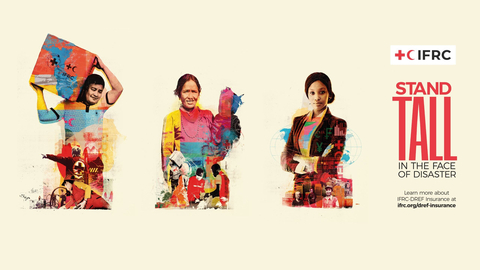IFRC-DREF calls on global donors to help the world ?Stand Tall? in the face of accelerating humanitarian need - supporting smarter and faster disaster relief
04.12.2023 - 05:31:44The International Federation of Red Cross and Red Crescent Societies (IFRC) has launched a new campaign to address rapidly escalating climate driven humanitarian crises. It calls on global governments and international donors to support local emergency responders and disaster hit communities - helping them to Stand Tall with smarter and faster humanitarian funding.
This press release features multimedia. View the full release here: https://www.businesswire.com/news/home/20231202510555/en/

Stand Tall in the face of disaster with IFRC-DREF Insurance. (Photo: Business Wire)
Today, 3.6 billion people live in areas highly susceptible to climate change. Humanitarian funding needs are growing as more people are adversely impacted by climate-related disasters each year. The signs are hard to ignore: IFRC-DREF funding allocation increased by 75% to meet escalating demands in the first half of 2023 compared to the same period in 2022 - predominately in response to floods and earthquakes.
Shoulder to shoulder - to Stand Tall
The Stand Tall campaign calls on global governments and private donors to stand shoulder to shoulder with local emergency responders and the communities they support. Stand Tall aims to grow the humanitarian funds available to on-the-ground relief organisations from the CHF 64 million (US$73 million) available today to CHF 100 million (US$114 million) by 2025.
Coinciding with COP28, IFRC’s Stand Tall campaign uses a series of visuals to champion the incredible network of donors, volunteers, and impacted communities that make up IFRC-DREF.
Nena Stoiljkovic, Under-Secretary General at IFRC, said: “In the battle against climate change, we have reached a critical juncture – funding needs outstrip supply as communities face more and more devastating impact. Our funding partners for IFRC-DREF enable us to deliver local response with global support.
“We take a moment to celebrate the incredible work and accomplishments of our inspiring network of funding partners and volunteers in impacted communities. We are proud of their determination and collaboration as we strive to prevent and lessen the burden of climate disasters on vulnerable communities. We encourage our partners to keep supporting IFRC-DREF’s action. Together, we will Stand Tall in the face of climate disasters.”
Smarter and faster funding - to those who need it, when they need it
Unlike other humanitarian funding mechanisms, 82% of IFRC-DREF funds go directly to National Societies supporting local action – compared with a global average of just 1.2%. Localised, community-led action is key to ensuring communities are equipped to prepare for, and overcome, devastating crises.
IFRC-DREF is evolving as it works to increase the impact of every donation to the fund. In September 2023, for example, IFRC announced the launch of IFRC-DREF Insurance - a truly innovative way to ensure that funding is always there for those who need it, when they need it. It acts as a back-stop to IFRC-DREF, bringing an additional CHF 20 million (c US $23 million) on stream, triggered during periods of high demand.
In helping to reach the CHF 100 million target by 2025, global governments and private donors can Stand Tall with emergency responders and their communities - saving lives and livelihoods in the face of climate driven disasters.
To learn more about IFRC-DREF and how donors can support its 2025 ambition, visit ifrc.org.
About the International Federation of the Red Cross and Red Crescent Societies (IFRC)
IFRC is the world’s largest humanitarian network, comprising 191 National Societies and bringing together more than 16 million volunteers working to save lives, build community resilience, strengthen localisation and promote dignity around the world.
About the IFRC’s Disaster Response Emergency Fund (IFRC-DREF)
Established in 1979, the IFRC-DREF is the quickest, most efficient, and most transparent mechanism for donors to channel global short-term emergency funding directly for local community-based action. While the average of international humanitarian funds directly channelled to local actors every year lies around 1.2% globally, 82% of IFRC-DREF’s allocation is directly transferred to the National Societies. Since its inception, more than 220 million people in crisis worldwide have benefited from IFRC-DREF support.
View source version on businesswire.com: https://www.businesswire.com/news/home/20231202510555/en/

